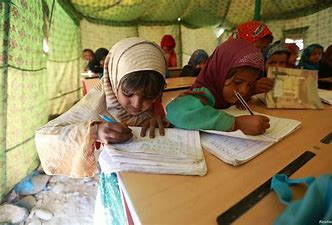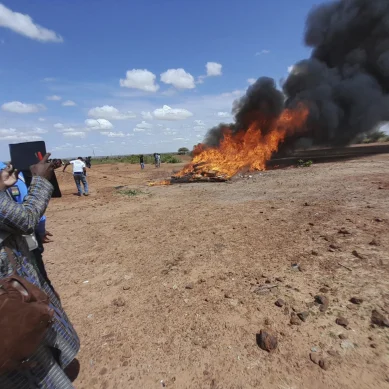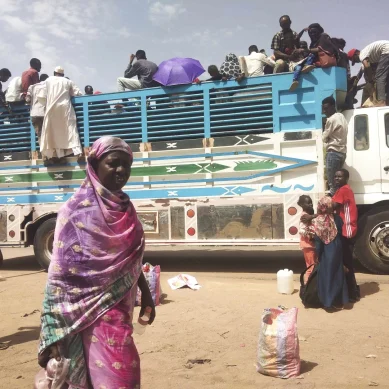
How conflict between Yemeni government and Houthi rebels crushed the dreams of four million refugees
As fighting intensifies around the central Yemeni city of Marib, thousands of people are being forced to flee the violence each week. But for many, this is just the latest upheaval in more than six and a half long years of war.
Sixty-five-year-old Salih al-Asoudi and his 14-member family have lived in three different camps since the early days of the war in 2015, when the conflict between Houthi rebels and the Yemeni government (backed by a Saudi Arabia and United Arab Emirates-led coalition) reached their hometown of Sirwah, in the western part of Marib province.
“We used to live in a big house that I built myself. It took me two years to build it. We ended up living in it for only three years, until the war turned us homeless,” he said from al-Sumayya camp, east of Marib city, where the family is now sheltering. “We move from one camp to the other.”
Al-Asoudi’s story is all too familiar to Yemenis, who have been plagued by violence, displacement and hunger since war broke out in March 2015.
Accurate statistics are hard to come by in all of Yemen, but the UN’s migration agency, IOM, said in a statement last month that 45,000 people have been forcibly displaced by the conflict around Marib since the beginning of September, shortly after a Houthi rebel offensive on the government-held city intensified.
The figure includes 15,000 people in November alone. The government’s Executive Unit for Internally Displaced Persons puts the total number at more than 93,000.
Al-Asoudi and thousands of others took refuge in Marib’s al-Sumayya camp in the wake of the latest surge in violence between Houthis and government forces.
Elsewhere, in the western province of Hodeidah, around 6,000 people have been uprooted from their homes over the past weeks as the government pulled its troops out, allowing the Houthis to move in.
These movements are part of a wider picture of a war that has left, by the UN’s estimation, more than four million people displaced across the country. Like al-Asoudi, most of them have been away from home for more than two years, and IOM says many have already had to flee multiple times.
Displacement makes getting or keeping a job even more difficult than it would otherwise be, in a country that has been economically decimated. It makes it hard for children to stay in school, and it removes any sense of stability.
It also leaves many dependent on aid, although al-Asoudi and other displaced people interviewed said that assistance has been hard to come by over the past few years.
Nevertheless, when the warring sides began fighting for control of his hometown, he and his family found themselves caught in the middle, with no option but to run for their lives.
“There was shooting and bombs everywhere. We fled, taking all that we could with us,” he recalled. “We couldn’t take everything, but we took our livestock and whatever we could carry.”
After leaving their homes, al-Asoudi’s family, and hundreds like them, settled in an area called al-Sawabin, near Marib’s dam: one of the area’s many resources that – along with natural gas – make it such a key prize for the warring parties.
It was also important for the new arrivals: Several displaced people said that their first priority was to settle near water, and as close to home as possible so they could return as soon as they felt it was safe to do so.
Little did they know that their first flight was just the first stage in a long cycle of displacement that would go on for years, with no end in sight.
Before the war, al-Asoudi made his living as a livestock herder, an income that was mostly cut off when he had to leave home. Some of the animals he managed to bring with him have died, and he was originally hopeful that the government or aid organisations would step in to help.
That was not the case. “Our numbers kept increasing. Thousands of families settled… on the banks of the Marib dam,” he said. “We had nothing but water.”
Al-Sawabin was the first of more than 161 camps in Marib province, according to the Yemeni government. The UN and most international aid groups estimate that around one million people have fled to Marib over the course of the war; the government puts the number closer to two million.
Some left because of violence, as bombs fell and front lines shifted. Others left Houthi-controlled areas when the group began arresting its opponents, said Fahmi al-Zubairi, who is based in Marib and works for the government’s human rights bureau.
As the numbers of displaced increased, so did disappointment in the humanitarian relief effort.
“The aid organisations are absent here. No one even tried to visit us,” said al-Asoudi. “But we made do with just being safe, and tried to start a new life, despite the suffering caused by being away from home.”
- The New Humanitarian report











